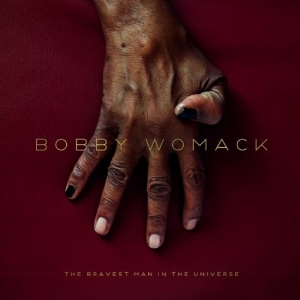Release Date: June 12, 2012
Label: XL Recordings
Like other sensitive kids who become writers, I got the message early on that boys don’t cry and real men keep a lid on their feelings. Yet anytime James Brown appeared on TV, the electricity was palpable as he wailed, danced, and screamed until he broke down, whereupon his assistant would wrap him in a cloak and escort him offstage, the audience applauding as if Jesus had turned water into wine, until he magically sprang back to life.
A similar transformative rupture takes place in Gorillaz’ 2010 single “Stylo.” Mos Def sets the stage with an abstract verse, Damon Albarn aches out a mournful melody, and then Bobby Womack bursts in, preaching of electric love passing through man and woman across the universe, until he climaxes in a Godfather-esque eruption of bottled-up emotion that every human, regardless of race or language, can translate: Life is painful, but also joyful, and we better let off steam like a tea kettle on a hot stove, or else we’ll all explode.
Some people are better equipped to articulate that message, and as he reminds us on The Bravest Man in the Universe, Bobby Womack remains among them. This 68-year-old soul man was the teenage guitarist for and protégé of Sam Cooke, and like many with his gift, he’s experienced more than his share of loss. When he married his mentor’s widow months after Cooke was fatally shot in 1964, stations stopped playing the Valentinos, his family’s band, even after the Rolling Stones scored an early hit with a cover of their “It’s All Over Now.” Womack retreated into songwriting and session work; he wrote for Janis Joplin and Wilson Pickett, and played on Aretha Franklin and Sly & the Family Stone milestones until his solo career picked up in the early ’70s. Unfortunately, his R&B hits rarely crossed over to pop, but his true tragedies were familial: His brother, immortalized in “Harry Hippie,” was killed in ’74; Womack’s infant son died in ’76, and another son committed suicide in ’86. Then the drugs took over, and although he eventually won his battles over coke and booze, the hits stopped coming until his granddaughter, a Gorillaz fan, urged Womack to let Albarn record him.
As with Gil Scott-Heron’s 2011 swansong I’m New Here, The Bravest is co-helmed by Richard Russell, the XL Records chief who once again invests his Adele cash in reviving an African-American vet forsaken back home but venerated abroad. Even at his popularity’s peak, Womack was wizened beyond his years; raspy and resigned, he’s always sounded old. Now he actually is, and although the scars in his voice signify tragedy, affliction, and self-abuse, his unwavering spirit speaks louder. He delivers the album’s thesis in the first few seconds: “The bravest man in the universe is the one who has forgiven first.” Womack has a lot to be forgiven for, and his regret crashes in waves before receding over a rumbling bass riff, a metronome-steady beat, and strings that imply the vastness of the ocean: “When you stay in the sun much too long / You try to find the shade, shade that makes you feel home.”
Before Gorillaz, Womack hadn’t subjected himself to revolutionary production: In the ’80s, when he scored with “If You Think You’re Lonely Now” — revived by Jodeci’s K-Ci Hailey in ’94 and quoted in Mariah Carey’s 2005 chart-topper “We Belong Together” — he was one of his era’s last icons to charm urban contemporary radio with traditional soul. Here, he makes symphonic post-dubstep his home while singing, writing, and strumming as Albarn and Russell throw bizarre yet complementary curveballs: the buzzing fly in “Please Forgive My Heart” or the bug-like Lana Del Ray who swoops into “Dayglo Reflection” after Womack’s first verse and simply takes over. Which, thankfully, isn’t an omen: Though Womack has battled myriad health problems, including a colon cancer diagnosis early this year, he was recently declared cancer-free.
As for The Bravest Man, it’s part of a process that started with ’70s disco: African-American singers teaming with electronics-enabled Europeans to create futurist gospel. Think of Donna Summer’s “I Feel Love,” the most radical, Moog-intensive chart record of its day; even today, the combination creates a supernatural vibe. Womack’s contributions are more in line with the church music of his pre-fame years than with his secular hits; production aside, they’re folky spirituals, even when he’s going after money-grabbing preachers on “Stupid.” It’s the tension between Womack’s soul and Albarn and Russell’s synths that gives this record its frisson. The album is like an Afro-Anglo version of Neon Genesis Evangelion, that ongoing anime franchise where kids merge with robots to battle God, patriarchy, and other heavy shit. Instead of neutralizing the singer (as sometimes happens with tech-heavy soul), the computers on The Bravest Man emphasize this R&B survivor’s quintessence, and vice versa. Womack famously sang “Across 110th Street” to capture the hell up in Harlem. Here, he crosses the Atlantic to scream of ghettos of the mind.





